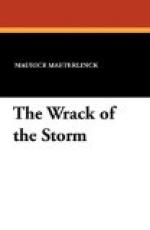At the present moment, when they are feeling the wind of defeat that blows through their tattered standard, it is possible that this solemn threat, officially pronounced, would force them to reflect, if indeed they are still at all capable of reflection. It is the only expedient that remains to us and there is no time to be lost. With certain adversaries the most barbarous threats are legitimate and necessary, for these threats speak the only language which they can understand. And our children must not one day be able to reproach us with not having attempted everything—even that which is most repugnant—to save the treasures which are theirs by right.
* * * * *
TO SAVE FOUR CITIES
IV
TO SAVE FOUR CITIES
1
First Louvain, Malines, Termonde, Lierre, Dixmude, Nieuport (and I am speaking only of the disasters of Flanders); now Ypres is no more and Furnes is half in ruins. By the side of the great Flemish cities, Brussels, Antwerp, Ghent and Bruges, those vast and incomparable living museums which have been watchfully preserved by a whole people, a people above all others attached to its traditions, they formed a constellation of little towns, delightful and hospitable, too little known to travellers. Each of them wore its own expression, of peace, pleasantness, innocent mirth, or meditation. Each possessed its treasures, jealously guarded: its belfries, its churches, its canals, its old bridges, its quiet convents, its ancient houses, which gave it a special physiognomy, never to be forgotten by those who had beheld it.
But the indisputable queen of these beautiful forsaken cities was Ypres, with its enormous market-place, bordered by little dwelling-houses with stepped gables, and its prodigious market-buildings, which occupied one whole side of the immense oblong. This market-place haunted for ever the memory of those who had seen it, were it but once, while waiting to change trains; it was so unexpected, so magical, so dream-like almost, in its disproportion to the rest of the town. While the ancient city, whose life had withdrawn itself from century to century, was gradually shrinking all around it, the Grand’Place itself remained an immovable, gigantic, magnificent witness to the might and opulence of old, when Ypres was, with Ghent and Bruges, one of the three queens of the western world, one of the most strenuous centres of human industry and activity and the cradle of our great liberties. Such as it was yesterday—alas, that I cannot say, such as it is to-day!—this square, with the enormous but unspeakably harmonious mass of those market-buildings, at once powerful and graceful, wild, gloomy, proud, yet genial, was one of the most wonderful and perfect spectacles that could be seen in any town on this old earth of ours. While




